|
The Washington Independent Review has picked Marmee & Louisa: The Untold Story of Louisa May Alcott and Her Mother as its book of the week. The review, by Susan Ware, general editor of American National Biography, begins, "Generations of readers have cherished gentle Marmee, the steadfast mother in Little Women who holds together her family of four girls while the father is off at war. According to Eve LaPlante, the real woman is much more interesting. Abigail May, an intellectually ambitious young woman, was thwarted by 19th-century gender expectations. Locked in a challenging marriage to a man who disdained the idea of making money, Abigail often had to fend for her family by herself. LaPlante emphasizes Abigail’s previously underappreciated role as Louisa’s muse, mentor and emotional lodestar, and reveals Abigail as an interesting character in her own right."
1 Comment
Bn.com has sold out of MARMEE & LOUISA, which is in its third printing! Both it and MY HEART IS BOUNDLESS were named best books of the year, the former by NPR and Salon and the latter by The Seattle Times.
It was wonderful talking to Anthony Brooks of Radio Boston (WBUR) the other day about the two new books, MARMEE & LOUISA and MY HEART IS BOUNDLESS. To listen, go to:
https://soundcloud.com/#radioboston/the-mother-behind-louisa-may 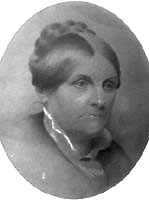 Abigail May Alcott, Louisa's mother BUST magazine has given MARMEE & LOUISA a five-breast review! This seems appropriate for a biography of a woman (Abigail May Alcott) who in September 1844 wrote to her sister-in-law Lucretia May, who had just given birth, "When God puts the babies in our laps, he places all the needfuls in its vicinity for its life and health - air, water, and Mother's titty is all it wants for a good while." 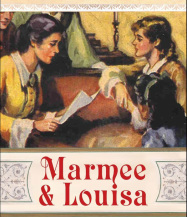 ...MARMEE & LOUISA and MY HEART IS BOUNDLESS! Returning by train from giving the Henry Whitney Bellows Lecture at All Souls Historical Society and a book talk at the New York Geneagraphical & Biographical Society, I'm tired and eager to see our daughters who are coming home from college for the holidays. Happy Thanksgiving! 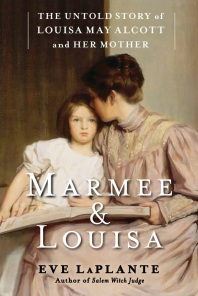 MARMEE & LOUISA has received great reviews in PEOPLE, USA TODAY, and BOOKPAGE. Reviewers are noting similarities between Abigail and Louisa May Alcott’s experiences and our experiences today. Women and girls in nineteenth-century America were constrained by the expectation that they be retiring, docile, and lacking in judgment or stature. Abigail and Louisa rebelled against this cultural convention, trying valiantly to achieve their dreams of freedom in a world that did not want or expect them to be more than private figures, mothers and housewives. Women today have more options and opportunities than the Alcott women had, but we still face some of the challenges they faced: how to balance work and family, how to hold children close while letting them go, how to combine a public and a private life, how to be true to one’s ideals without causing harm, and how to find a voice in a world that does not listen. These remain struggles today. Having helped to "emancipate the slave," Abigail May Alcott wrote after the Civil War, women must "work out their own emancipation." In 1875, when she penned those words in a petition for female suffrage, Abigail had been active for forty-five years in the movements to abolish slavery and to allow women to vote. She knew that she, at seventy-four, would not live to vote, but her adult daughters might. None of her daughters survived long enough to see it, but in 1920, with the Nineteenth Amendment, women did work out their own emancipation, as Abigail May Alcott had hoped.
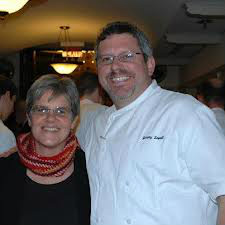 Eve with Jeremy Sewall Chef Jeremy Sewall - of Island Creek Oysters, Lineage, and Eastern Standard fame - and I were invited to WBUR and the New Enland Historical and Genealogical Society to talk about food and our ancestor Samuel Sewall, the Salem witch judge. Delicious! To hear some of our conversation about this remarkable judge, Samuel Sewall, whose portrait hangs in Abigail May Alcott's bedroom at Orchard House in Concord, Massachusetts, please click: http://radioboston.wbur.org/2012/10/17/judge-samuel-sewall 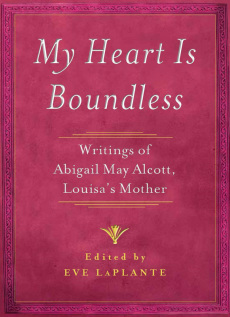 It's incredible that Abigail May Alcott has so long been ignored. The papers of her husband and daughter Louisa have been in print for generations, while her journals and letters are being published only now. The conventional wisdom was that Abigail’s papers were all burned, as Louisa claimed. Louisa made the same claim about her own private papers, though, and that did not deter scholars from finding and publishing hundreds of pages of Louisa’s surviving letters and journals. In the case of Abigail, her papers were neglected and her importance was obscured. Could it be that as readers of Little Women we felt we already knew the character of Louisa’s real “Marmee”? A larger phenomenon may be at work here. Women, long excluded from American public life, have largely been neglected in American history. Think how few female figures in American history were not (at least first) the wives of famous men. In early America a woman was expected to be silent in church and all other public spaces. Her proper realm was private; if she held public power she was seen as a threat to society. Women who challenged this established order were hanged as witches or banished as heretics. This, too, may explain why Abigail May Alcott’s writings have so long been hiding in plain sight -- a few in attic trunks and rural farmhouses, but most of them in university and archival collections. |
AuthorEve is the author of Who Needs A Statue?, Seized, American Jezebel, Marmee & Louisa, and Salem Witch Judge. Archives
July 2024
Categories
All
|

 RSS Feed
RSS Feed